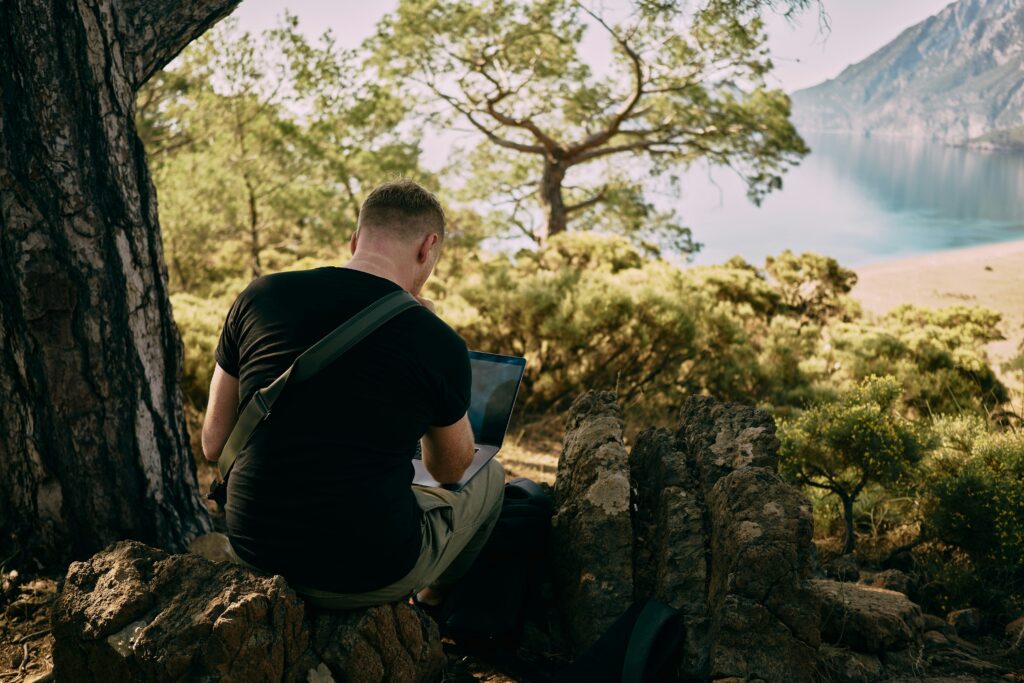The digital nomad lifestyle is more popular than ever, making the right set of tools and gear essential for remote work success. The best digital nomad tools and remote work gear make working from anywhere possible by boosting productivity, improving communication, and keeping data secure. Whether someone is managing an online business from a beach or collaborating with a team across different time zones, the right software and accessories help streamline daily work.
With tech and work trends always changing, digital nomads need to stay up to date on the latest apps, online business tools, and hardware that let them work smoothly and efficiently. From project management platforms to must-have gadgets and financial management apps, there are many options that help digital nomads stay organized, connected, and productive anywhere in the world. Those wanting the most current gear and software can explore thorough lists, like the ones found at Digital Nomad Cafe, to make life on the road easier.
Key Takeaways
- The right tools help digital nomads work efficiently and stay organized.
- Productivity, communication, and secure online business tools are key for remote work.
- Up-to-date digital nomad gear supports a smooth and flexible work lifestyle.

Must-Have Digital Nomad Tools and Gear
Reliable gear and smart tools let digital nomads work from nearly anywhere while staying efficient and comfortable. Choosing equipment that can handle travel and daily remote work is key to building a successful location-independent routine.
Laptop Essentials
A lightweight, durable laptop is at the core of every digital nomad workspace. Strong battery life is a must, as outlets are not always available during travel or in coffee shops. Models like the MacBook Air M2 or Dell XPS 13 offer long hours on a single charge and are small enough to fit in most travel backpacks.
Fast SSD storage keeps files safe and loads programs in seconds. Minimizing ports can be a problem, so many nomads rely on USB-C hubs or docking stations. Extra features such as a backlit keyboard and built-in webcam add comfort and convenience in various work settings.
Protecting a laptop from spills and bumps is important. Using a sturdy laptop sleeve helps avoid costly accidents. Cloud storage via Google Drive or Dropbox backs up work automatically, helping avoid data loss (more here).
Smartphone and Mobile Accessories
A smartphone becomes a lifeline for navigation, communication, and even payments abroad. Models with reliable battery life, fast charging, and strong cameras help capture work and daily moments. Many use dual SIM features or eSIMs like Airalo for easy data access in different countries (learn more).
Key mobile accessories include a compact power bank (like Anker PowerCore), a universal adapter that covers global outlets, and noise-canceling headphones for calls in public places. Carrying a portable hotspot or getting a local SIM ensures fast and secure internet even in remote locations.
Popular apps such as Google Maps, VPNs like NordVPN, and secure payment tools like Wise and PayPal give digital nomads the freedom to work and move with fewer limitations.
Backpacks and Minimal Packing
A well-designed backpack supports a digital nomad’s gear and daily movement. Anti-theft features, waterproof fabrics, and padded laptop compartments protect expensive devices from accidents and theft. Many prefer carry-on-sized backpacks like the Nomatic Travel Bag or Aer Travel Pack due to their durability and organized storage spaces.
Keeping the load light is important for frequent travelers. Packing cubes and compression bags save space and help separate essentials. A packing checklist usually includes a laptop, portable monitor, notebook, chargers, adapters, noise-canceling headphones, and personal items for hygiene and health.
Used wisely, a backpack can also store backup drives and emergency snacks for long workdays or travel delays (essential tips).
Portable Monitor and Ergonomics
A portable monitor can double the available workspace, making it easier to multitask when working from an Airbnb, café, or hotel. Lightweight options from brands like ASUS ZenScreen or Lenovo ThinkVision fit easily into most backpacks and run on USB-C or HDMI.
Benefits of a second screen:
- Easier to view several documents or code at once
- Improved productivity for editing or project management
- Better posture by raising eye level
An ergonomic setup also means less strain. Many nomads carry folding laptop stands and compact Bluetooth keyboards and mice to create a healthier, more adjustable workstation anywhere. Paired with noise-canceling headphones, these accessories help create a focused space in noisy environments. Sticking with portable but sturdy gear keeps the setup comfortable and efficient on the go.

Productivity and Project Management Tools
Managing work from anywhere depends on using the right digital tools. With the right setup, digital nomads and remote workers can organize tasks, track time, and improve focus without feeling overwhelmed.
Task and Project Management Apps
Efficient task and project management is key for teams and solo workers alike. Tools like Trello make it simple to track work through kanban boards, lists, and cards. Its clear layout lets users organize assignments, set deadlines, and monitor progress at a glance.
ClickUp is another powerful choice, offering task views, dashboards, and strong collaboration features. Workflows can be managed with custom fields, project templates, and automations, which reduce manual steps and keep everyone informed.
Monday.com and Notion are also widely used. Notion combines notes and project tracking in one place, which is helpful for freelancers juggling many projects.
To compare features at a glance:
| App | Best For | Key Features |
|---|---|---|
| Trello | Simplicity | Boards, cards, automations |
| ClickUp | Customization | Views, dashboards, integrations |
| Notion | All-in-one workspace | Docs, databases, templates |
You can read more about some of the best digital nomad tools at ClickUp’s digital nomad tools guide.
Time Management Solutions
Tracking time is important when working for clients or managing flexible work hours. Apps like Toggl Track offer easy time logging with one-click timers, reporting, and integrations with other platforms. This helps digital nomads bill clients the right amount and see how long projects take.
Calendar tools such as SavvyCal help schedule meetings across time zones. You set preferred time slots, making it easy for people to book meetings that fit everyone’s schedule. Reminders and notifications help prevent missed calls or deadlines.
Many remote work tools offer built-in time tracking, but a dedicated timer like Toggl or RescueTime can give more control and insights. These apps can also spotlight where time is lost, helping users adjust their schedules for better productivity. Explore top picks and reviews in ClickUp’s tool comparison.
Productivity and Focus Tools
Staying productive as a digital nomad requires more than just managing tasks. Focus tools can help limit distractions and keep attention on what matters. App blockers such as Freedom or Cold Turkey restrict access to distracting sites during work hours.
Pomodoro timers—like Focus Booster—help users break work into short bursts followed by rest, which can boost sustained productivity. Noise-canceling headphones or background apps such as Noisli help remote workers create their ideal environment wherever they are.
Integrated tools like Notion support productivity by combining note-taking, to-do lists, and databases in one dashboard. AI-powered tools and templates can further help automate repetitive work, so time can be spent on high-impact tasks. For more options, see digital nomad top tool lists at ClickUp or Nomadic Memoir.

Communication, Collaboration, and Security
Remote work for digital nomads depends on strong communication, secure networks, and useful online communities. Good tools and services keep people connected, productive, and safe, no matter where they work from.
Video Conferencing and Communication Apps
Zoom has become a standard tool for video meetings. It provides high-quality video and audio, easy scheduling with calendar integration, and meeting recording features. Digital nomads use Zoom to attend team meetings and talk with clients from around the world.
Slack is popular for direct messaging, group conversations, and quick file sharing. Slack’s organized channels help remote workers keep discussions on topic. It also connects with other remote work tools, making project updates and questions easy to handle in one place.
For those managing international time zones, apps like World Time Buddy help schedule calls across different regions. Many remote teams choose a mix of these apps to stay organized, responsive, and in sync. For more details on the top tools used in 2025, this guide offers a full list of options.
Coworking Spaces and Networking Platforms
Coworking spaces are a key resource for digital nomads. They offer stable internet, desks, and a quiet place to work away from home or crowded cafes. Some spaces include meeting rooms and community events that help members meet new people and find job leads.
Online networking platforms like Nomad List provide up-to-date information on destinations, community reviews, and local events. Nomad List also helps people connect for meetups and find coworking spaces in new cities.
For women, platforms such as Digital Nomad Girls offer dedicated groups for support and professional networking. The combination of online and physical spaces gives digital nomads the flexibility to build a work-friendly environment anywhere. These resources are explained in more detail in this article on digital nomad tools.
VPN Services and Online Security
Working from different countries often means using public Wi-Fi, which can put private information at risk. Using a virtual private network, or VPN, is essential for security. VPN services encrypt the user’s internet connection, hiding it from hackers and keeping data private.
NordVPN is known for its fast connections, wide selection of server locations, and strong security features. Another trusted choice, ExpressVPN, offers user-friendly apps and reliable, uncensored internet access in many countries.
Both VPNs let digital nomads work safer in airports, hotels, or coworking spaces. Secure connections also help access online business tools that might be blocked in some regions. Details on reliable VPN solutions for remote work can be found here.

Online Business and Financial Tools
Digital nomads manage important data, send money internationally, and communicate from various locations. These tasks call for secure file storage, smart financial solutions, reliable internet access, and apps that support well-being.
Cloud Storage and File Sharing
Storing business documents and creative files in the cloud is a must for anyone working remotely. Services like Google Drive and Dropbox make files easy to access, edit, and share from any device with an internet connection. This keeps work and backups organized while protecting files even if a device is lost or broken.
Cloud platforms often work with popular tools such as Slack and Zoom. This lets users send links to files, collaborate in real time, and avoid version control problems. With flexible storage plans, both solo entrepreneurs and teams can find options that fit their needs and budget.
To read more about top tools for file access and sharing, visit this list of best remote work tools for digital nomads in 2025.
Financial Management and Payments
Handling money from different countries is a regular part of running an online business abroad. Platforms like Wise (formerly TransferWise) make international payments easy with low fees and multi-currency accounts. Freelancers and business owners can invoice clients in their clients’ own currencies while saving money on currency exchange.
Digital banks and finance apps often include expense tracking, virtual cards, and banking services made for frequent travelers. For instance, Grey offers international money transfers and simple currency exchange. Having the right financial tools ensures fast and safe payments, budget management, and reporting.
Explore how these options help with currency issues and remote business payments in this guide to essential digital nomad finance tools.
Staying Connected on the Go
A steady internet connection is the backbone of remote work and online business. Many digital nomads rely on a mobile hotspot to get online where public Wi-Fi is not available or safe. Devices from brands like Skyroam and GlocalMe let users buy local or global data packages and connect several devices at once.
These portable hotspots are often compact, making them easy to pack. They also use encryption for some privacy protection. For higher speeds, some travelers buy prepaid SIM cards or eSIMs in each country, but mobile hotspots are a simple backup option for those who visit many destinations each year.
Comparing mobile internet devices and SIM options can help travelers pick the best way to stay online wherever they go.
Health and Wellness Apps
Long hours and changing routines take a toll on anyone working on the road. Wellness apps help monitor mental and physical health. Headspace offers guided meditations and breathing exercises to reduce stress and increase focus.
Apps like MyFitnessPal let users track meals and exercise, which can help with healthy habits in new locations where routines are disrupted. Some wellness apps include reminders to move, drink water, or take screen breaks. They also store data in the cloud, letting people check their progress across devices.
Using the right digital wellness tools supports work-life balance and long-term productivity, no matter where someone is working from. For more on keeping healthy on the move, see the full list of digital nomad health apps.

Frequently Asked Questions
Digital nomads depend on a mix of reliable tools, high-performing hardware, and smart strategies to stay productive on the road. Using the right apps and devices helps remote teams work efficiently and helps solo online business owners stay focused and organized.
What are the essential tools for managing a remote team effectively?
Leading a remote team is easier with solid communication and project management platforms. Tools like Slack and Microsoft Teams allow for instant messaging and group discussions. Project and task management is handled well by apps like Trello, Asana, or ClickUp.
Shared calendars and collaborative docs, such as those from Google Workspace, help teams coordinate deadlines and exchange feedback. Video conferencing tools like Zoom and Google Meet are also necessary for face-to-face meetings.
Which portable hardware devices are must-haves for continuous travel and work?
A lightweight, durable laptop is often the primary device for digital nomads. Many also carry a tablet or e-reader for reading and secondary tasks. Compact external hard drives or portable SSDs provide secure storage and backup for files.
Noise-canceling headphones improve focus in busy spaces. Multi-port USB chargers, universal travel adapters, and high-capacity power banks ensure devices stay powered anywhere. Many professionals also recommend a portable Wi-Fi hotspot for reliable connections.
For more detailed gear ideas, see these digital nomad tech and remote work gear essentials for 2025.
What software is recommended for secure and efficient online business operations?
Strong security is critical. Virtual Private Network (VPN) services like NordVPN or ExpressVPN protect online activity. Password managers such as LastPass or 1Password keep logins safe. For finance, invoicing, and accounting, software like QuickBooks or FreshBooks is commonly used.
Cloud storage solutions, including Google Drive and Dropbox, provide safe, accessible backup for documents. Secure two-factor authentication and regular software updates further protect business data.
What are the top-rated productivity apps favored by remote workers?
Popular note-taking and organization apps like Notion, Evernote, and OneNote help digital nomads track tasks and projects. Time management is supported by tools like RescueTime and Toggl, which monitor focus and breaks.
For blocking distractions, apps such as Freedom or Cold Turkey are useful. Many remote professionals use Calendly or Google Calendar for scheduling and meeting management.
A roundup of the most useful apps for nomads can be found in this guide to essential digital nomad tools.
How do you maintain reliable internet connectivity when working from various locations?
Staying connected starts with carrying a portable wireless hotspot or MiFi device, which uses local SIM cards for data. Researching and choosing accommodations with fast and stable Wi-Fi is also important.
When traveling, some remote workers rely on coworking spaces or libraries for strong internet connections. It is wise to have backup connection methods, including tethering with a mobile phone, for critical work deadlines.
Check out top gear and connectivity tips for digital nomads for more information.
What are the best strategies for staying organized while managing an online business?
Organizational success comes from using digital calendars, task management tools, and shared drives for team document access. Setting clear daily or weekly goals helps keep work on track.
Digital nomads often automate repetitive tasks with workflow tools like Zapier. Regular backups and maintaining minimal, clutter-free digital files make it easier to focus on important business tasks and reduce stress from information overload.
You Might Also Like:
If you enjoyed this post on The Ultimate Digital Nomad Toolkit, you might also like: Guide: How to Work Abroad and Make Money While Traveling, Want to Work Overseas? Discover the Best Countries for Jobs and Rich Culture, Remote work and Roaming Free: A Global Career You’ll Love
